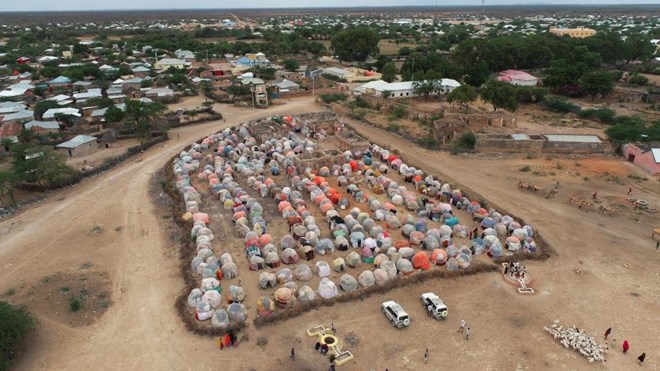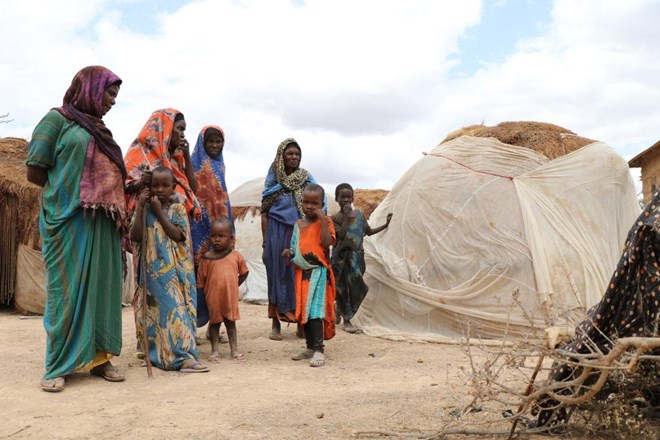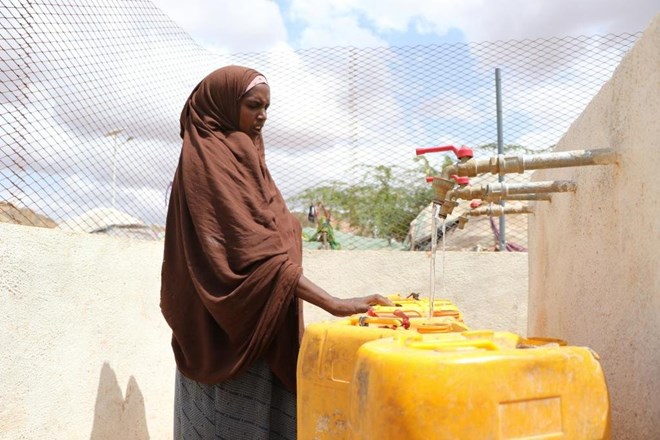
Friday September 3, 2021
By Abdulkadir Mohamed

Hudur is a town under siege. For the last seven years, the main supply routes to and from this provincial capital in south-west Somalia have been blocked and controlled by Al Shabaab. Food and other commodities have had to be transported by donkey carts. And in the last two months, the situation has got even worse.
Deliveries can be airlifted in, but this means high transportation costs – out of reach for most consumers. As a result, goods are becoming more scarce and prices are rising.
Water shortages are also a growing problem. Rainfall harvesting is an important source of fresh water for the residents of Hudur. But the Gu rains – Somalia’s annual rainfall – have been below average in recent years. As a result, the ponds and shallow wells have started to dry up. Crop yields have been low and livestock have suffered.
According to local reports, almost 30,000 people have fled their homes in the area in recent months, mainly from the outskirts of Hudur town. They were unable to take their belongings and travelled on foot or by donkey. Many were older people, children, pregnant women, or people with disabilities.
Currently, there are 20 active displacement sites in the area, hosting 9,263 families – some 55,578 individuals. Three new sites have appeared since April this year alone. Some 21,300 people are expected to require urgent humanitarian assistance in Hudur during the period July to September 2021.
Hit and run attacks on the town take place frequently during the night, and humanitarian agencies have limited presence in the area.

New arrivals in one of Hudur's displacement camps. Photo: Abdulkadir/NRC
The situation was becoming desperate and rapid solutions were needed. So, in 2020, the Norwegian Refugee Council (NRC) implemented a project to provide both clean water and solar-powered streetlighting to the struggling community. The project, called “Integrated protection response to vulnerable and displaced populations in Hudur district”, was funded by the Somalia Humanitarian Fund (SHF).
Safe drinking water on the doorstep
As part of the project, we rehabilitated a well and water tank, and installed new water points in the displacement camps, providing free and safe drinking water to over 13,500 individuals.
Muslimo Abdi Ibrahim and her family of nine children had been living in the Dondardid camp since fleeing their home village outside Hudur. Due to the lack of water, they were only able to wash properly twice a week, in order to save water for cooking and drinking.
Muslimo told us that her family needed water more than anything else in their life. Now, thanks to the new water point, she and the other vulnerable families in Dondardid camp can access water easily.
“We have free and safe drinking water in our doorstep. I can comfortably fetch enough water. My family can use water for drinking, cooking, washing clothes and bathing. Nothing to worry about at the moment,” she said.

Muslimo Abdi Ibrahim collects water from the camp’s new water point, constructed by NRC and funded by SHF. Photo: Abdulkadir/NRC
“The darkness is over now”
During the seven long years of siege, the communities of Hudur district have been afraid to walk the streets at night because of the lack of streetlighting. All the businesses in the town closed at 5.00 pm in the afternoon. There was no social gathering after dark, and the residents locked themselves up in their homes.
“After sunset, everyone goes home. People could not walk anywhere in the town, especially women, because of fear. Anything can happen under the cover of darkness, so we stayed home,” says Habiba Ali Borow, a local resident.
As part of our project, we rehabilitated 32 solar streetlights in one of Hudur’s main streets. Life for the residents was transformed. They are now doing business and socialising on the streets after sunset.

Ruqiyo Ibrahim, selling milk at night time along the main street of Hudur. Photo: Abdulkadir/NRC
“After years of fear and darkness, the main street has been illuminated. The darkness is over now. When the lights started working, we felt like we had got out of prison. We can walk freely at night to shop or visit friends, relatives and neighbours without any fear,” Habiba told us.
Ruqiyo Ibrahim, a mother of seven who sells milk along Hudur’s main street, has seen her business double since the streetlights were installed. Shops, restaurants and other businesses can now stay open at night for as long as there are people who want to shop.
“Young people are enjoying tea in outdoor tea-shops because of the solar streetlights,” she says. “Children are also playing football along the side of the main street, and we thank NRC and SHF for that.”